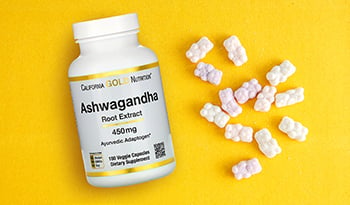Gummy Vitamins—Not Just for Kids!
DISCLAIMER:This blog does not intend to provide diagnosis...
- In this article:
- The following supplements are available as gummies:
- Elderberry Gummies
- Gummies for the Immune System
- Hair, Skin and Nails
- Can vegetarians consume gummies?

Difficulty swallowing tablets and capsules is an issue that many encounter. As a result, I have had numerous patients over the years ask for alternatives. I often suggest gummy supplements, which can be chewed—and as a bonus, they can also help those with absorption issues as gummies are more readily absorbed into the body since they are chewed prior to being swallowed. Gummy supplements are a great option for both adults and parents who want to make sure their young children are supplementing their diet with adequate vitamins and minerals.
(Note: Gummy vitamins are usually recommended for those 4 years of age or older due to choking risk.)
The following supplements are available as gummies:
- Multivitamins
- Vitamin B12
- Vitamin C
- Vitamin D
- Omega-3 Fish Oil
- Coenzyme Q10
- Melatonin
- Probiotics
- Elderberry
Multivitamins
The American Medical Association, the leading medical organization in the world, says that multivitamins should be taken to optimize health. On June 19, 2002, a study in the Journal of the American Medical Association made the following recommendation:
“We recommend that all adults take one multivitamin daily. This practice is justified mainly by the known and suspected benefits of supplemental folate and vitamins B12, B6, and D in preventing cardiovascular disease, cancer, and osteoporosis and because multivitamins at that dose are safe and inexpensive”
While a well-balanced diet and daily exercise are crucial to optimizing health, daily stressors and chronic health conditions can add increased metabolic and nutrient demands on your body. These nutrient needs may not always be fulfilled with diet alone. Additionally, many popular prescription drugs can also deplete the body of important vitamins and minerals.
A quality gummy multivitamin provides extra assurance that the body is getting what it needs. If extra nutrients are present, the body will store what it needs and eliminate the additional.
Options available include Adult Gummy Multivitamins, Prenatal Vitamins and Children Gummy Multivitamins.
Suggested Dose: Take as directed on the label
Vitamin B12
Vitamin B12 (also referred to as cobalamin or cyanocobalamin) is an important nutrient that your body requires to help optimize brain, nerve, and blood health. However, despite its importance, there's plenty of evidence showing that people around the world are deficient in this essential nutrient. Those who have had intestinal surgery, including weight loss surgery, are also at risk for a vitamin B12 deficiency.
Studies demonstrate that up to one in six (17 percent) of those aged 60 and older are deficient in vitamin B12 while upwards to one in 15 (six percent) of those under age 60 are deficient. But, this isn't just a health concern for Americans. In the northern part of China, for instance, a 2014 study showed up to 45 percent of Chinese women were deficient in vitamin B12. This is a problem in many different regions around the world.
Signs and Symptoms of B12 deficiency
Due to vitamin B12’s importance to the human body, various problems can occur when a person has low levels. Symptoms include anemia, memory issues, and depression, according to study out of Harvard University.
A vitamin B12 deficiency can result in the following conditions
- Anemia
- Low platelets or elevated number of platelets
- Burning tongue (burning mouth syndrome)
- Depression
- Fatigue
- Insomnia
- Loss of balance
- Loss of smell
- Memory loss – Vitamin B12 deficiency is more common in those with dementia
- Numbness and tingling in legs and arms, referred to as "peripheral neuropathy" by doctors. (Neuropathy is common in those with diabetes but may also affect those with prediabetes or no diabetes)
- Ringing in the ears (tinnitus)
Suggested dose: 500 to 1,000 mcg per day
Vitamin C
Vitamin C, or ascorbic acid, is a crucial vitamin with antioxidant properties. According to a 2009 study in The American Journal of Clinical Nutrition, over seven percent of people age six and older were vitamin C deficient based on blood tests. More than half surveyed consumed low amounts. Vitamin C levels are lower in those who smoke.
A few years ago, I diagnosed a 40-year-old patient in my practice with scurvy. The patient was a smoker with a poor diet, who was exhibiting bleeding gums and easy bruising. After the patient's dentist confirmed the absence of gum disease, a blood test confirmed the vitamin C deficiency, which lead to the diagnosis of scurvy. This individual's symptoms improved after a few weeks of vitamin C supplementation.
Vitamin C plays a significant role in collagen formation, the main component of arteries and skin. Collagen is also important to keep one’s teeth healthy. Studies show a diet high in foods containing vitamin C are good for the heart. For those who take an iron gummy supplement for anemia, a vitamin C gummy can help increase the absorption of the iron in the small intestine.
Suggested dose: Take between 250 mg to 500 mg daily.
Vitamin D
Worldwide, about four in five patients have a clinical vitamin D deficiency. Thousands of studies over the last decade show health benefits in those with optimal vitamin D levels. The studies tell us that those with higher levels of vitamin D in their blood have a lower risk for heart attacks, breast cancer, colon cancer, ovarian cancer, multiple sclerosis, and other health complications.
The reason for this common deficiency is that few people spend the required 15 to 20 minutes each day in the sunlight, allowing their face, arms and legs to be exposed to the ultraviolet light. Those with more melanin, which is responsible for skin pigmentation, require up to 30 minutes in the sun per day to generate adequate vitamin D. Those over age 65 years also require more time outdoors to generate vitamin D due to reduced skin elasticity.
A 2017 study from University of San Diego showed that college football players who had lower vitamin D levels were more likely to be injured than those with higher blood levels. But, getting sufficient vitamin D is crucial for all people, not just athletes.
Lower levels of vitamin D in the blood have been associated with increased risk for the following conditions:
- Breast cancer
- Ovarian cancer
- Pancreatic cancer
- Fibromyalgia
- Falls and fractures
- Autoimmune diseases
- High blood pressure
- Heart attacks and strokes
Suggested dose: 1,000 IU to 5,000 IU daily (ask your doctor what is best for you)
Omega-3 Fish Oil
Omega-3 essential fatty acids consist primarily of particularly eicosapentaenoic acid (EPA) and docosahexaenoic acid (DHA). A 2014 study in Nutrition Journal showed that the majority of Americans do not consume enough omega-3 fatty acids. They can be found in a variety of food sources, which include fish (mackerel, cod, and salmon are among the richest), walnuts, chia seeds, flax seeds, hemp seeds, and natto.
A 2017 study in Future Science showed omega-3 oils can reduce inflammation that can lead to heart disease. A 2017 study in Atherosclerosis showed that higher levels of omega-3 in the blood could reduce death from heart disease by 30 percent. This is significant being that one in four deaths in the United States is due to heart disease.
Drug companies manufacture and sell a pharmaceutical grade fish oil, which has been shown to lower triglyceride levels by 50 percent. However, non-pharmaceutical fish oil capsules also appear to provide the same benefit at a fraction of the cost. Fish oil supplements are also available in gummy formulas.
Suggested dose: Take as directed on the label
Coenzyme Q10
Coenzyme Q10 is required for cells to generate energy. This is done primarily, in a part of the cell doctors call mitochondria. Mitochondria is like a “power plant” that generates energy for the human body. If our biological power plants do not generate sufficient energy, fatigue is often a result.
Since the heart is the most active of all organs, it produces and requires the most CoQ10 in order to meet its metabolic demands. However, in those with cardiac disease, higher levels of CoQ10 are frequently desired.
If you have the following, you may benefit from Coenzyme Q10 supplementation:
- Migraine headaches
- Chronic Fatigue Syndrome
- Fibromyalgia
- Poor memory
- Elevated blood pressure
- Congestive heart failure
- Metabolic disease
- Facial wrinkles
When a Co-enzyme Q10 supplement is taken, the body will convert 90 percent of the CoQ10 into ubiquinol, the active form of the vitamin.
A 2017 study, which reviewed 14 other studies, showed a benefit of CoQ10. The results showed those who took CoQ10 were 31 percent less likely to die from complications of congestive heart failure.
Suggested dose of Coenzyme Q10 gummies is 100 mg to 300 mg per day
Melatonin
Melatonin is the hormone necessary for one to get a good night's sleep. As we age, melatonin levels decrease, which is why those 65 years of age and older frequently have difficulty getting proper sleep. People of all ages who work the night shift (or graveyard shift) frequently have sleeping problems due to disruption of their circadian rhythm, the 24-hour cycle that tells us when to eat and sleep among other everyday behaviors. Ironically, commonly prescribed sleeping medications (ie. zolpidem, temazepam) lower melatonin levels in the body which commonly results in a dependency on the sleeping medication.
Suggested dose: 3 to 5 mg each night of melatonin gummies
Probiotics
Probiotics, the term used to describe healthy bacteria, are also available in a gummy formula. Our intestines require the presence of good bacteria in order to assist with digestion and to help maintain the health of our immune system. Examples of healthy bacteria include lactobacilli and bifidobacteria. Probiotics are frequently taken by those with digestive issues and by those who undergo a course of probiotics.
In addition to digestive benefits, probiotics have been shown to be effective in the prevention of upper respiratory infections and appear to be an up-and-coming treatment for chronic sinus disease. A 2015 study by Cochrane Review showed those taking probiotics were less likely to develop an upper respiratory infection, less likely to need antibiotics, and less likely to miss school when compared to those subjects not taking probiotics.
Suggested dose: 3 billion to 30 billion units daily
Elderberry Gummies
Elderberry(Sambucus nigra L.) has historically been used by many indigenous cultures for upper respiratory infections. A 2016 study concluded that elderberry showed a significant reduction of cold duration and cold severity in air travelers who took the herb. Studies also show elderberry has activity against the influenza virus. Elderberry gummies provide a rich source of this potent antioxidant.
Suggested dose: Elderberry extract 50 mg daily
Gummies for the Immune System
There are also various types of gummies available which help provide immune system support. These gummies include vitamin C, zinc and vitamin D, known to play an important role in helping to strengthen the immune system and fight viruses.
Hair, Skin and Nails
Gummy supplements can also help with hair, skin and nail health—important nutrients for this includes vitamin C and biotin.
Other supplements available on the market include those with iron gummies, fiber gummies, and calcium gummies.
Can vegetarians consume gummies?
Initially, gummies were made using gelatin, meaning that they would not be suitable for those who consume a vegetarian diet as gelatin is derived from animal cartilage. However, there are numerous gelatin-free gummy vitamins now available. If avoiding gelatin is important, one must simply read the label closely.
References:
- Fletcher RH, Fairfield KM. Vitamins for Chronic Disease Prevention in Adults Clinical Applications. JAMA.2002;287(23):3127–3129. doi:10.1001/jama.287.23.3127
- Students show 17% of those 60 and older are vitamin B12 deficient, page 62, accessed October 29, 2017 https://www.cdc.gov/nutritionreport/pdf/Nutrition_Book_complete508_final.pdf
- Dang S, Yan H, Zeng L, et al. The Status of Vitamin B12 and Folate among Chinese Women: A Population-Based Cross-Sectional Study in Northwest China. Sengupta S, ed. PLoS ONE. 2014;9(11):e112586. doi:10.1371/journal.pone.0112586. Accessed October 17, 2017
- https://www.health.harvard.edu/blog/vitamin-b12-deficiency-can-be-sneaky-harmful-201301105780
- Am J Clin Nutr. 2009 Nov;90(5):1252-63. doi: 10.3945/ajcn.2008.27016. Epub 2009 Aug 12.
- Heart Advis. 2015 Oct;18(10):10.
- Vitamin D and injury among college football players accessed January 27, 2018. https://timesofsandiego.com/tech/2017/12/21/lack-vitamin-d-factor-athletes-muscle-injuries/
- Papanikolaou Y, Brooks J, Reider C, Fulgoni VL. U.S. adults are not meeting recommended levels for fish and omega-3 fatty acid intake: results of an analysis using observational data from NHANES 2003–2008. Nutrition Journal. 2014;13:31. doi:10.1186/1475-2891-13-31.
- Bäck M. Omega-3 fatty acids in atherosclerosis and coronary artery disease. Future Science OA. 2017;3(4):FSO236. doi:10.4155/fsoa-2017-0067.
- Atherosclerosis. 2017 Jul;262:51-54. doi: 10.1016/j.atherosclerosis.2017.05.007. Epub 2017 May 6.
- 1 In 4 deaths due to heart disease in the USA. Accessed January 27, 2018 https://www.cdc.gov/heartdisease/facts.htm
- Lei L, Liu Y. Efficacy of coenzyme Q10 in patients with cardiac failure: a meta-analysis of clinical trials. BMC Cardiovascular Disorders. 2017;17:196. doi:10.1186/s12872-017-0628-9.
- Hao Q, Dong B, Wu T. Probiotics for preventing acute upper respiratory tract infections. Cochrane Database of Systematic Reviews 2015, Issue 2. Art. No.: CD006895. DOI: 10.1002/14651858.CD006895.pub3
- Krawitz C, Mraheil MA, Stein M, et al. Inhibitory activity of a standardized elderberry liquid extract against clinically-relevant human respiratory bacterial pathogens and influenza A and B viruses. BMC Complementary and Alternative Medicine. 2011;11:16. doi:10.1186/1472-6882-11-16.

 By Dr. Eric Madrid, M.D.
By Dr. Eric Madrid, M.D.


